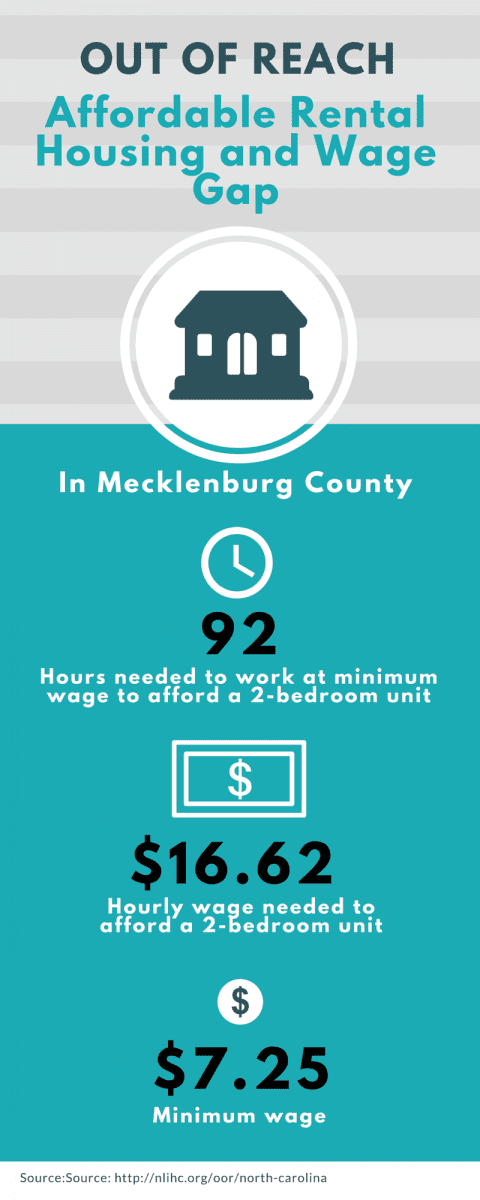In 2016, housing remains out of reach for many

For workers in Mecklenburg County, it has become even harder to afford housing, according to the National Low Income Housing Coalition’s latest Out of Reach report. The 2016 report documents the gap between wages and fair market rents (for standard-quality rental units) in communities across the United States.[i] The fair market rent takes into account the cost of the rental unit plus “all tenant-paid utilities, except telephones, cable, or satellite television services, and internet service.” [ii]
The report found that in the Mecklenburg County metropolitan area, a worker earning the federal minimum wage of $7.25 per hour must work 92 hours a week (or an average of 15 hours a day, six days a week) to afford the rent and utilities for a basic two-bedroom apartment. Last year, that number was 88 hours. In 2015, in order to afford a two-bedroom unit at fair market rent and not pay more than 30 percent of their gross income on housing expenses, workers would have to earn $16.62 per hour—which is $9.37 more than minimum wage.
Put in real terms, this means that a single parent must work 92 hours per week to afford a two-bedroom apartment for their children—not taking into account day care costs while their parent is working or other costs such as transportation and medical expenses.
What this also means is that based on median wages, there are bus drivers, preschool teachers, teaching assistants, security guards and many other lower wage workers, working 40-plus hours per week, who cannot afford a two-bedroom unit for their families.[1]
Mecklenburg County is not alone in having a mismatch between rental housing costs and wages. The report found that in both 2015 and 2016, there was not a single state in the United States where a one-income household could afford a one- or two- bedroom unit making the federal minimum wage and working the standard 40 hours per week.
Last year’s 2015 Housing Instability in Charlotte-Mecklenburg Report, part of a report series on housing instability and homelessness produced by UNC Charlotte’s Urban Institute and funded by Mecklenburg County Community Support Services, pointed out that since 2008, the median household income in Mecklenburg County has decreased by 12 percent while gross rent has increased by 2 percent. Meanwhile, the federal minimum wage has not increased since 2009.[2] 
IMPLICATIONS
The combined impact of wage stagnation and income inequality alongside rising housing costs and lack of affordable housing hurts families of all kinds in Mecklenburg County. Low-income households making below 50 percent of the Area Median Income (less than $33,600 for a family of four[3]) face the greatest challenge.
The Out of Reach report offers several policy interventions to address this vast problem. Public investments in housing programs are vital to address the shortage of affordable housing to low-income households. The national Housing Trust Fund will receive nearly $173.6 million this summer to use toward building, preserving and rehabilitating affordable rental housing. Raising the minimum wage is another way to address the gap, but the report indicates that the impact of a slightly higher wage is limited, since it would require $16.62 an hour (more than double the minimum wage) to afford a two-bedroom apartment in Mecklenburg County.
We know the effect of housing and neighborhoods are connected to economic mobility. We can look to the 2014 study that ranked the Charlotte commuting zone last in mobility among America’s 50th largest cities to see that the five correlated factors to mobility—segregation, school quality, social capital, family structure, and income inequality—are intertwined with housing availability and wages. All of us see the faces of those who are affected in our community—the childcare worker who is responsible for your children, the server who brought you your meal last night, or the security guard you greet on your way into work every morning.
The findings of the Out of Reach Report underscore the urgency that exists for Mecklenburg County to address the problem of access and availability of affordable housing for all residents.
Courtney Morton is the housing and homelessness research coordinator for Mecklenburg County Community Support Services. The county has contracted with the UNC Charlotte Urban Institute to provide research and create reports on homelessness and housing instability.
[i] The fair market rent is developed by the U.S. Department of Housing and Urban Development and provides an estimate of gross rent for a “standard-quality rental housing unit” in the current market.
[ii] U.S. Department of Housing and Urban Development. (2007). Fair Market Rents for the Section 8 Housing Assistance Payments Program. Retrieved from: https://www.huduser.gov/portal/datasets/fmr.html
[1] Source: Bureau of Labor Statistics. (2015). Occupational Employment Statistics: May 2014 Metropolitan and Nonmetropolitan Area Occupational Employment and Wage Estimates- Charlotte-Gastonia-Rock Hill, NC-SC. United States Department of Labor. Retrieved from: http://www.bls.gov/oes/current/oes_16740.htm#00-0000
[2] https://www.dol.gov/whd/minwage/chart.htm
[3] Source: U.S. Department of Housing and Urban Development. 2015. FY2015 FMR and IL Summary System. Retrieved from: http://www.huduser.org/portal/datasets/fmr/fmr_il_history.html
Courtney Morton